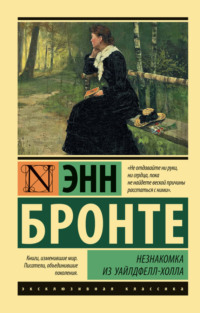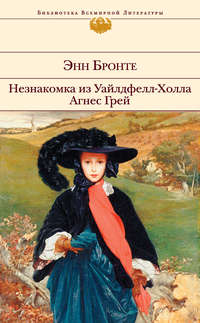 полная версия
полная версияThe Tenant of Wildfell Hall
'Oh, yes! come in,' said she (for I had met them in the garden). 'It is finished and framed, all ready for sending away; but give me your last opinion, and if you can suggest any further improvement, it shall be – duly considered, at least.'
The picture was strikingly beautiful; it was the very scene itself, transferred as if by magic to the canvas; but I expressed my approbation in guarded terms, and few words, for fear of displeasing her. She, however, attentively watched my looks, and her artist's pride was gratified, no doubt, to read my heartfelt admiration in my eyes. But, while I gazed, I thought upon the book, and wondered how it was to be presented. My heart failed me; but I determined not to be such a fool as to come away without having made the attempt. It was useless waiting for an opportunity, and useless trying to concoct a speech for the occasion. The more plainly and naturally the thing was done, the better, I thought; so I just looked out of the window to screw up my courage, and then pulled out the book, turned round, and put it into her hand, with this short explanation:
'You were wishing to see 'Marmion,' Mrs. Graham; and here it is, if you will be so kind as to take it.'
A momentary blush suffused her face – perhaps, a blush of sympathetic shame for such an awkward style of presentation: she gravely examined the volume on both sides; then silently turned over the leaves, knitting her brows the while, in serious cogitation; then closed the book, and turning from it to me, quietly asked the price of it – I felt the hot blood rush to my face.
'I'm sorry to offend you, Mr. Markham,' said she, 'but unless I pay for the book, I cannot take it.' And she laid it on the table.
'Why cannot you?'
'Because,' – she paused, and looked at the carpet.
'Why cannot you?' I repeated, with a degree of irascibility that roused her to lift her eyes and look me steadily in the face.
'Because I don't like to put myself under obligations that I can never repay – I am obliged to you already for your kindness to my son; but his grateful affection and your own good feelings must reward you for that.'
'Nonsense!' ejaculated I.
She turned her eyes on me again, with a look of quiet, grave surprise, that had the effect of a rebuke, whether intended for such or not.
'Then you won't take the book?' I asked, more mildly than I had yet spoken.
'I will gladly take it, if you will let me pay for it.' I told her the exact price, and the cost of the carriage besides, in as calm a tone as I could command – for, in fact, I was ready to weep with disappointment and vexation.
She produced her purse, and coolly counted out the money, but hesitated to put it into my hand. Attentively regarding me, in a tone of soothing softness, she observed, – 'You think yourself insulted, Mr Markham – I wish I could make you understand that – that I – '
'I do understand you, perfectly,' I said. 'You think that if you were to accept that trifle from me now, I should presume upon it hereafter; but you are mistaken:– if you will only oblige me by taking it, believe me, I shall build no hopes upon it, and consider this no precedent for future favours:– and it is nonsense to talk about putting yourself under obligations to me when you must know that in such a case the obligation is entirely on my side, – the favour on yours.'
'Well, then, I'll take you at your word,' she answered, with a most angelic smile, returning the odious money to her purse – 'but remember!'
'I will remember – what I have said; – but do not you punish my presumption by withdrawing your friendship entirely from me, – or expect me to atone for it by being more distant than before,' said I, extending my hand to take leave, for I was too much excited to remain.
'Well, then! let us be as we were,' replied she, frankly placing her hand in mine; and while I held it there, I had much difficulty to refrain from pressing it to my lips; – but that would be suicidal madness: I had been bold enough already, and this premature offering had well-nigh given the death-blow to my hopes.
It was with an agitated, burning heart and brain that I hurried homewards, regardless of that scorching noonday sun – forgetful of everything but her I had just left – regretting nothing but her impenetrability, and my own precipitancy and want of tact – fearing nothing but her hateful resolution, and my inability to overcome it – hoping nothing – but halt, – I will not bore you with my conflicting hopes and fears – my serious cogitations and resolves.
Chapter IX
Though my affections might now be said to be fairly weaned from Eliza Millward, I did not yet entirely relinquish my visits to the vicarage, because I wanted, as it were, to let her down easy; without raising much sorrow, or incurring much resentment, – or making myself the talk of the parish; and besides, if I had wholly kept away, the vicar, who looked upon my visits as paid chiefly, if not entirely, to himself, would have felt himself decidedly affronted by the neglect. But when I called there the day after my interview with Mrs. Graham, he happened to be from home – a circumstance by no means so agreeable to me now as it had been on former occasions. Miss Millward was there, it is true, but she, of course, would be little better than a nonentity. However, I resolved to make my visit a short one, and to talk to Eliza in a brotherly, friendly sort of way, such as our long acquaintance might warrant me in assuming, and which, I thought, could neither give offence nor serve to encourage false hopes.
It was never my custom to talk about Mrs. Graham either to her or any one else; but I had not been seated three minutes before she brought that lady on to the carpet herself in a rather remarkable manner.
'Oh, Mr. Markham!' said she, with a shocked expression and voice subdued almost to a whisper, 'what do you think of these shocking reports about Mrs. Graham? – can you encourage us to disbelieve them?'
'What reports?'
'Ah, now! you know!' she slily smiled and shook her head.
'I know nothing about them. What in the world do you mean, Eliza?'
'Oh, don't ask me! I can't explain it.' She took up the cambric handkerchief which she had been beautifying with a deep lace border, and began to be very busy.
'What is it, Miss Millward? what does she mean?' said I, appealing to her sister, who seemed to be absorbed in the hemming of a large, coarse sheet.
'I don't know,' replied she. 'Some idle slander somebody has been inventing, I suppose. I never heard it till Eliza told me the other day, – but if all the parish dinned it in my ears, I shouldn't believe a word of it – I know Mrs. Graham too well!'
'Quite right, Miss Millward! – and so do I – whatever it may be.'
'Well,' observed Eliza, with a gentle sigh, 'it's well to have such a comfortable assurance regarding the worth of those we love. I only wish you may not find your confidence misplaced.'
And she raised her face, and gave me such a look of sorrowful tenderness as might have melted my heart, but within those eyes there lurked a something that I did not like; and I wondered how I ever could have admired them – her sister's honest face and small grey optics appeared far more agreeable. But I was out of temper with Eliza at that moment for her insinuations against Mrs. Graham, which were false, I was certain, whether she knew it or not.
I said nothing more on the subject, however, at the time, and but little on any other; for, finding I could not well recover my equanimity, I presently rose and took leave, excusing myself under the plea of business at the farm; and to the farm I went, not troubling my mind one whit about the possible truth of these mysterious reports, but only wondering what they were, by whom originated, and on what foundations raised, and how they could the most effectually be silenced or disproved.
A few days after this we had another of our quiet little parties, to which the usual company of friends and neighbours had been invited, and Mrs. Graham among the number. She could not now absent herself under the plea of dark evenings or inclement weather, and, greatly to my relief, she came. Without her I should have found the whole affair an intolerable bore; but the moment of her arrival brought new life to the house, and though I might not neglect the other guests for her, or expect to engross much of her attention and conversation to myself alone, I anticipated an evening of no common enjoyment.
Mr. Lawrence came too. He did not arrive till some time after the rest were assembled. I was curious to see how he would comport himself to Mrs. Graham. A slight bow was all that passed between them on his entrance; and having politely greeted the other members of the company, he seated himself quite aloof from the young widow, between my mother and Rose.
'Did you ever see such art?' whispered Eliza, who was my nearest neighbour. 'Would you not say they were perfect strangers?'
'Almost; but what then?'
'What then; why, you can't pretend to be ignorant?'
'Ignorant of what?' demanded I, so sharply that she started and replied, -
'Oh, hush! don't speak so loud.'
'Well, tell me then,' I answered in a lower tone, 'what is it you mean? I hate enigmas.'
'Well, you know, I don't vouch for the truth of it – indeed, far from it – but haven't you heard —?'
'I've heard nothing, except from you.'
'You must be wilfully deaf then, for anyone will tell you that; but I shall only anger you by repeating it, I see, so I had better hold my tongue.'
She closed her lips and folded her hands before her, with an air of injured meekness.
'If you had wished not to anger me, you should have held your tongue from the beginning, or else spoken out plainly and honestly all you had to say.'
She turned aside her face, pulled out her handkerchief, rose, and went to the window, where she stood for some time, evidently dissolved in tears. I was astounded, provoked, ashamed – not so much of my harshness as for her childish weakness. However, no one seemed to notice her, and shortly after we were summoned to the tea-table: in those parts it was customary to sit to the table at tea-time on all occasions, and make a meal of it, for we dined early. On taking my seat, I had Rose on one side of me and an empty chair on the other.
'May I sit by you?' said a soft voice at my elbow.
'If you like,' was the reply; and Eliza slipped into the vacant chair; then, looking up in my face with a half-sad, half-playful smile, she whispered, – 'You're so stern, Gilbert.'
I handed down her tea with a slightly contemptuous smile, and said nothing, for I had nothing to say.
'What have I done to offend you?' said she, more plaintively. 'I wish I knew.'
'Come, take your tea, Eliza, and don't be foolish,' responded I, handing her the sugar and cream.
Just then there arose a slight commotion on the other side of me, occasioned by Miss Wilson's coming to negotiate an exchange of seats with Rose.
'Will you be so good as to exchange places with me, Miss Markham?' said she; 'for I don't like to sit by Mrs. Graham. If your mamma thinks proper to invite such persons to her house, she cannot object to her daughter's keeping company with them.'
This latter clause was added in a sort of soliloquy when Rose was gone; but I was not polite enough to let it pass.
'Will you be so good as to tell me what you mean, Miss Wilson?' said I.
The question startled her a little, but not much.
'Why, Mr. Markham,' replied she, coolly, having quickly recovered her self-possession, 'it surprises me rather that Mrs. Markham should invite such a person as Mrs. Graham to her house; but, perhaps, she is not aware that the lady's character is considered scarcely respectable.'
'She is not, nor am I; and therefore you would oblige me by explaining your meaning a little further.'
'This is scarcely the time or the place for such explanations; but I think you can hardly be so ignorant as you pretend – you must know her as well as I do.'
'I think I do, perhaps a little better; and therefore, if you will inform me what you have heard or imagined against her, I shall, perhaps, be able to set you right.'
'Can you tell me, then, who was her husband, or if she ever had any?'
Indignation kept me silent. At such a time and place I could not trust myself to answer.
'Have you never observed,' said Eliza, 'what a striking likeness there is between that child of hers and – '
'And whom?' demanded Miss Wilson, with an air of cold, but keen severity.
Eliza was startled; the timidly spoken suggestion had been intended for my ear alone.
'Oh, I beg your pardon!' pleaded she; 'I may be mistaken – perhaps I was mistaken.' But she accompanied the words with a sly glance of derision directed to me from the corner of her disingenuous eye.
'There's no need to ask my pardon,' replied her friend, 'but I see no one here that at all resembles that child, except his mother, and when you hear ill-natured reports, Miss Eliza, I will thank you, that is, I think you will do well, to refrain from repeating them. I presume the person you allude to is Mr. Lawrence; but I think I can assure you that your suspicions, in that respect, are utterly misplaced; and if he has any particular connection with the lady at all (which no one has a right to assert), at least he has (what cannot be said of some others) sufficient sense of propriety to withhold him from acknowledging anything more than a bowing acquaintance in the presence of respectable persons; he was evidently both surprised and annoyed to find her here.'
'Go it!' cried Fergus, who sat on the other side of Eliza, and was the only individual who shared that side of the table with us. 'Go it like bricks! mind you don't leave her one stone upon another.'
Miss Wilson drew herself up with a look of freezing scorn, but said nothing. Eliza would have replied, but I interrupted her by saying as calmly as I could, though in a tone which betrayed, no doubt, some little of what I felt within, – 'We have had enough of this subject; if we can only speak to slander our betters, let us hold our tongues.'
'I think you'd better,' observed Fergus, 'and so does our good parson; he has been addressing the company in his richest vein all the while, and eyeing you, from time to time, with looks of stern distaste, while you sat there, irreverently whispering and muttering together; and once he paused in the middle of a story or a sermon, I don't know which, and fixed his eyes upon you, Gilbert, as much as to say, "When Mr. Markham has done flirting with those two ladies I will proceed."'
What more was said at the tea-table I cannot tell, nor how I found patience to sit till the meal was over. I remember, however, that I swallowed with difficulty the remainder of the tea that was in my cup, and ate nothing; and that the first thing I did was to stare at Arthur Graham, who sat beside his mother on the opposite side of the table, and the second to stare at Mr. Lawrence, who sat below; and, first, it struck me that there was a likeness; but, on further contemplation, I concluded it was only in imagination.
Both, it is true, had more delicate features and smaller bones than commonly fall to the lot of individuals of the rougher sex, and Lawrence's complexion was pale and clear, and Arthur's delicately fair; but Arthur's tiny, somewhat snubby nose could never become so long and straight as Mr. Lawrence's; and the outline of his face, though not full enough to be round, and too finely converging to the small, dimpled chin to be square, could never be drawn out to the long oval of the other's, while the child's hair was evidently of a lighter, warmer tint than the elder gentleman's had ever been, and his large, clear blue eyes, though prematurely serious at times, were utterly dissimilar to the shy hazel eyes of Mr. Lawrence, whence the sensitive soul looked so distrustfully forth, as ever ready to retire within, from the offences of a too rude, too uncongenial world. Wretch that I was to harbour that detestable idea for a moment! Did I not know Mrs. Graham? Had I not seen her, conversed with her time after time? Was I not certain that she, in intellect, in purity and elevation of soul, was immeasurably superior to any of her detractors; that she was, in fact, the noblest, the most adorable, of her sex I had ever beheld, or even imagined to exist? Yes, and I would say with Mary Millward (sensible girl as she was), that if all the parish, ay, or all the world, should din these horrible lies in my ears, I would not believe them, for I knew her better than they.
Meantime, my brain was on fire with indignation, and my heart seemed ready to burst from its prison with conflicting passions. I regarded my two fair neighbours with a feeling of abhorrence and loathing I scarcely endeavoured to conceal. I was rallied from several quarters for my abstraction and ungallant neglect of the ladies; but I cared little for that: all I cared about, besides that one grand subject of my thoughts, was to see the cups travel up to the tea-tray, and not come down again. I thought Mr. Millward never would cease telling us that he was no tea-drinker, and that it was highly injurious to keep loading the stomach with slops to the exclusion of more wholesome sustenance, and so give himself time to finish his fourth cup.
At length it was over; and I rose and left the table and the guests without a word of apology – I could endure their company no longer. I rushed out to cool my brain in the balmy evening air, and to compose my mind or indulge my passionate thoughts in the solitude of the garden.
To avoid being seen from the windows I went down a quiet little avenue that skirted one side of the inclosure, at the bottom of which was a seat embowered in roses and honeysuckles. Here I sat down to think over the virtues and wrongs of the lady of Wildfell Hall; but I had not been so occupied two minutes, before voices and laughter, and glimpses of moving objects through the trees, informed me that the whole company had turned out to take an airing in the garden too. However, I nestled up in a corner of the bower, and hoped to retain possession of it, secure alike from observation and intrusion. But no – confound it – there was some one coming down the avenue! Why couldn't they enjoy the flowers and sunshine of the open garden, and leave that sunless nook to me, and the gnats and midges?
But, peeping through my fragrant screen of the interwoven branches to discover who the intruders were (for a murmur of voices told me it was more than one), my vexation instantly subsided, and far other feelings agitated my still unquiet soul; for there was Mrs. Graham, slowly moving down the walk with Arthur by her side, and no one else. Why were they alone? Had the poison of detracting tongues already spread through all; and had they all turned their backs upon her? I now recollected having seen Mrs. Wilson, in the early part of the evening, edging her chair close up to my mother, and bending forward, evidently in the delivery of some important confidential intelligence; and from the incessant wagging of her head, the frequent distortions of her wrinkled physiognomy, and the winking and malicious twinkle of her little ugly eyes, I judged it was some spicy piece of scandal that engaged her powers; and from the cautious privacy of the communication I supposed some person then present was the luckless object of her calumnies: and from all these tokens, together with my mother's looks and gestures of mingled horror and incredulity, I now concluded that object to have been Mrs. Graham. I did not emerge from my place of concealment till she had nearly reached the bottom of the walk, lest my appearance should drive her away; and when I did step forward she stood still and seemed inclined to turn back as it was.
'Oh, don't let us disturb you, Mr. Markham!' said she. 'We came here to seek retirement ourselves, not to intrude on your seclusion.'
'I am no hermit, Mrs. Graham – though I own it looks rather like it to absent myself in this uncourteous fashion from my guests.'
'I feared you were unwell,' said she, with a look of real concern.
'I was rather, but it's over now. Do sit here a little and rest, and tell me how you like this arbour,' said I, and, lifting Arthur by the shoulders, I planted him in the middle of the seat by way of securing his mamma, who, acknowledging it to be a tempting place of refuge, threw herself back in one corner, while I took possession of the other.
But that word refuge disturbed me. Had their unkindness then really driven her to seek for peace in solitude?
'Why have they left you alone?' I asked.
'It is I who have left them,' was the smiling rejoinder. 'I was wearied to death with small talk – nothing wears me out like that. I cannot imagine how they can go on as they do.'
I could not help smiling at the serious depth of her wonderment.
'Is it that they think it a duty to be continually talking,' pursued she: 'and so never pause to think, but fill up with aimless trifles and vain repetitions when subjects of real interest fail to present themselves, or do they really take a pleasure in such discourse?'
'Very likely they do,' said I; 'their shallow minds can hold no great ideas, and their light heads are carried away by trivialities that would not move a better-furnished skull; and their only alternative to such discourse is to plunge over head and ears into the slough of scandal – which is their chief delight.'
'Not all of them, surely?' cried the lady, astonished at the bitterness of my remark.
'No, certainly; I exonerate my sister from such degraded tastes, and my mother too, if you included her in your animadversions.'
'I meant no animadversions against any one, and certainly intended no disrespectful allusions to your mother. I have known some sensible persons great adepts in that style of conversation when circumstances impelled them to it; but it is a gift I cannot boast the possession of. I kept up my attention on this occasion as long as I could, but when my powers were exhausted I stole away to seek a few minutes' repose in this quiet walk. I hate talking where there is no exchange of ideas or sentiments, and no good given or received.'
'Well,' said I, 'if ever I trouble you with my loquacity, tell me so at once, and I promise not to be offended; for I possess the faculty of enjoying the company of those I – of my friends as well in silence as in conversation.'
'I don't quite believe you; but if it were so you would exactly suit me for a companion.'
'I am all you wish, then, in other respects?'
'No, I don't mean that. How beautiful those little clusters of foliage look, where the sun comes through behind them!' said she, on purpose to change the subject.
And they did look beautiful, where at intervals the level rays of the sun penetrating the thickness of trees and shrubs on the opposite side of the path before us, relieved their dusky verdure by displaying patches of semi-transparent leaves of resplendent golden green.
'I almost wish I were not a painter,' observed my companion.
'Why so? one would think at such a time you would most exult in your privilege of being able to imitate the various brilliant and delightful touches of nature.'
'No; for instead of delivering myself up to the full enjoyment of them as others do, I am always troubling my head about how I could produce the same effect upon canvas; and as that can never be done, it is more vanity and vexation of spirit.'
'Perhaps you cannot do it to satisfy yourself, but you may and do succeed in delighting others with the result of your endeavours.'
'Well, after all, I should not complain: perhaps few people gain their livelihood with so much pleasure in their toil as I do. Here is some one coming.'
She seemed vexed at the interruption.
'It is only Mr. Lawrence and Miss Wilson,' said I, 'coming to enjoy a quiet stroll. They will not disturb us.'
I could not quite decipher the expression of her face; but I was satisfied there was no jealousy therein. What business had I to look for it?
'What sort of a person is Miss Wilson?' she asked.
'She is elegant and accomplished above the generality of her birth and station; and some say she is ladylike and agreeable.'
'I thought her somewhat frigid and rather supercilious in her manner to-day.'
'Very likely she might be so to you. She has possibly taken a prejudice against you, for I think she regards you in the light of a rival.'









